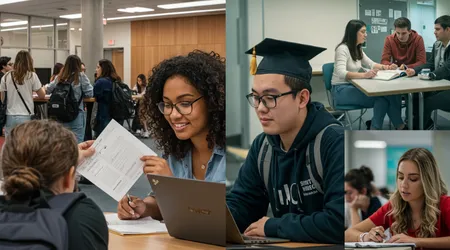Supporting College Students with ADHD Beyond Accommodations

Supporting college students with ADHD requires more than just accommodations; it demands a holistic, empathetic approach that empowers them to thrive.
Higher education can be a transformative yet challenging journey for students with Attention-Deficit/Hyperactivity Disorder (ADHD), where unique neurological wiring often clashes with rigid academic structures.
While accommodations like extended test time or note-taking assistance are critical, they alone don’t address the full spectrum of challenges these students face executive functioning struggles, social integration, or emotional self-regulation.
In 2025, with ADHD diagnoses rising among college populations, universities must evolve to foster inclusive environments that celebrate neurodiversity.
This article explores innovative, evidence-based strategies beyond traditional accommodations, weaving practical solutions with real-world examples to ensure these students succeed academically and personally.
Why does this matter? The stakes are high: students with ADHD are more likely to face academic setbacks, with a 2021 study showing they have a 20% higher dropout rate than neurotypical peers.
Yet, their potential for creativity, hyperfocus, and problem-solving is immense when properly supported. By rethinking how we approach supporting college students with ADHD, institutions can unlock their strengths, creating a ripple effect of confidence and achievement.
This piece dives into fostering self-advocacy, leveraging technology, building community, and embracing neurodiversity-affirming practices, offering a roadmap for educators, students, and families.
Fostering Self-Advocacy and Empowerment
Empowering students with ADHD to advocate for themselves is a cornerstone of their success. College demands independence, but ADHD can impair executive functioning, making self-management daunting.
Teaching students to articulate their needs builds resilience and confidence. For example, consider Maya, a sophomore who struggled with deadlines due to ADHD-related time blindness.
Through a campus workshop, she learned to communicate her challenges to professors, requesting structured feedback. This small step transformed her academic experience, boosting her GPA by a full point.
Workshops on self-advocacy can teach students to navigate disability services effectively. These programs should include role-playing scenarios to practice requesting accommodations confidently.
++ How to Make School Field Trips Accessible for All Students
Universities like the University of Denver offer such initiatives through their Learning Effectiveness Program, guiding students to articulate needs clearly.
Beyond workshops, mentorship programs pair students with faculty or peers who understand ADHD. These mentors provide practical advice, like breaking assignments into manageable chunks, fostering a sense of agency.
Maya’s mentor, for instance, helped her create visual schedules, reducing overwhelm and enhancing productivity.

Leveraging Technology for Personalized Support
Technology offers tailored tools to support ADHD students’ unique needs. Apps like Notion or Todoist help with organization, breaking tasks into actionable steps.
For instance, Jake, a junior, uses Todoist to set micro-deadlines for essays, combating procrastination effectively. These tools empower students to manage their time independently.
Assistive technologies, such as text-to-speech software, enhance focus during reading-heavy courses.
Platforms like Recite Me’s assistive toolbar, adopted by universities like NCCU in 2024, provide ADHD-friendly features like customizable fonts and reading aids, improving comprehension.
Also read: Creating Inclusive School Events: Practical Guidelines
Digital mindfulness apps, like Headspace, also support emotional regulation. Guided sessions help students manage stress, a common trigger for ADHD symptoms.
By integrating these tools into daily routines, students gain control over their academic challenges.
| Tool | Purpose | Example Use Case |
|---|---|---|
| Todoist | Task management | Setting micro-deadlines for assignments |
| Recite Me Toolbar | Reading accessibility | Customizing fonts for better focus |
| Headspace | Emotional regulation | Guided mindfulness to reduce stress |
Building Community and Peer Support
Isolation can exacerbate ADHD challenges, making community-building vital. Peer support groups create safe spaces for students to share experiences and strategies.
At Beacon College, ADHD students meet weekly to discuss time management, fostering camaraderie and reducing loneliness.
Faculty-led initiatives, like study groups tailored for ADHD students, promote collaboration. These groups use interactive formats, such as gamified quizzes, to maintain engagement.
Read more: Teaching Literacy to Students with Learning Disabilities: Modern Approaches
Jake found these sessions more effective than solitary study, as they kept him accountable and motivated.
Campus events celebrating neurodiversity, like panel discussions, normalize ADHD. These initiatives connect students with role models, showing them that success is attainable.
Universities should prioritize such programs to build a sense of belonging.
Embracing Neurodiversity-Affirming Practices
Recognizing ADHD as a form of diversity, not a deficit, transforms educational approaches. Universal Design for Learning (UDL) creates flexible curricula that benefit all students.
For example, offering multiple assessment formats like oral presentations or written essays allows ADHD students to showcase strengths.
Faculty training in UDL, as seen at Augsburg University, enhances understanding of ADHD needs. Professors learn to provide clear instructions and varied teaching methods, reducing barriers.
This approach fosters an inclusive classroom where ADHD students thrive.
Strength-based teaching also celebrates ADHD traits like creativity. Encouraging students to tackle projects in innovative ways leverages their hyperfocus, turning perceived weaknesses into assets.
Imagine ADHD as a vibrant, untamed river: with the right channels, it powers remarkable outcomes.
Integrating Mental Health Support
ADHD often coexists with anxiety or depression, amplifying academic stress. Universities must integrate mental health resources into ADHD support frameworks.
Counseling services tailored for ADHD, like those at Northeastern University, offer coping strategies for emotional regulation.
Group therapy sessions provide a platform for students to address co-occurring challenges. These sessions teach mindfulness techniques, helping students like Maya manage impulsivity.
Accessibility to such resources ensures holistic support for supporting college students with ADHD.
Online mental health platforms, like BetterHelp, offer flexible access to therapists specializing in ADHD. These services bridge gaps for students unable to attend in-person sessions, ensuring consistent emotional support.
Collaborating with Faculty and Staff

Faculty collaboration is key to supporting college students with ADHD. Professors trained in ADHD awareness can adapt teaching methods, like providing recorded lectures for review.
This flexibility helps students process information at their own pace.
Regular communication between disability services and faculty ensures accommodations are implemented effectively.
For example, a professor might allow flexible deadlines after consulting with a disability advisor, easing pressure on students like Jake.
Staff development programs, such as those offered by UKAAN, equip educators with strategies to support ADHD students.
These initiatives foster empathy and practical skills, creating a more inclusive academic environment.
Advocating for Policy Changes
Institutional policies must evolve to prioritize supporting college students with ADHD. Current frameworks often categorize ADHD as a specific learning difficulty, marginalizing its unique challenges.
Advocating for ADHD-specific categories, as suggested by UKAAN in 2022, ensures targeted support.
Streamlined access to diagnostic assessments reduces delays in accommodations. Universities should partner with local clinics to expedite evaluations, addressing the long NHS wait times noted in recent studies.
Policy advocacy also includes funding for ADHD programs. Allocating budgets for specialized support, like Northeastern’s Learning Disabilities Program, ensures resources are available to meet students’ needs.
FAQs
What are the best tools for supporting college students with ADHD?
Apps like Todoist, Recite Me, and Headspace help with task management, reading accessibility, and emotional regulation, tailored to ADHD needs.
How can faculty support students with ADHD beyond accommodations?
Faculty can offer flexible deadlines, provide recorded lectures, and engage in UDL training to create inclusive, ADHD-friendly classrooms.
In 2025, supporting college students with ADHD goes beyond checking boxes for accommodations it’s about building systems that celebrate their strengths.
By fostering self-advocacy, leveraging technology, creating community, embracing neurodiversity, integrating mental health support, collaborating with faculty, and advocating for policy changes, universities can transform the academic experience.
These students aren’t just navigating college; they’re redefining what success looks like.
With the right support, their potential is limitless, like a spark igniting a wildfire of innovation and resilience. What will it take for higher education to fully embrace this vision?
